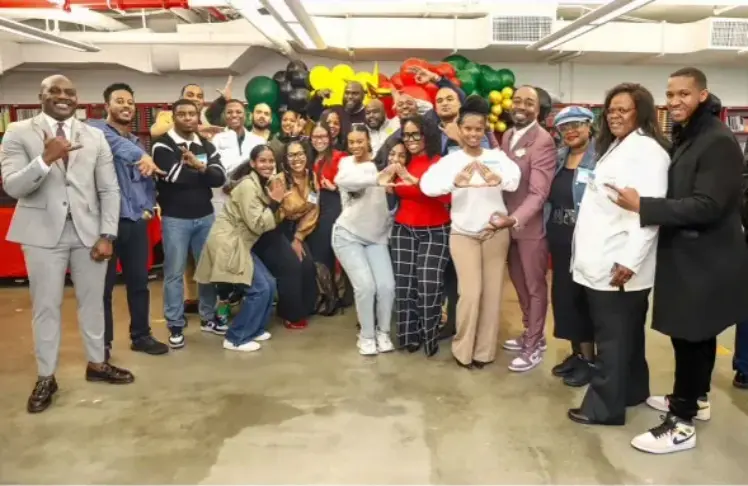
by Aziah Siid
Career days happen nationwide at schools, giving students a dose of “if you can see it you can be it” realness. Sure, some kids may see the day as an escape from the academic side of school, but it’s easier to be enthusiastic about career day when the people offering insights into their professions, the hurdles they’ve leaped over, and the milestones they’ve celebrated are actually relatable.
So picture this: Black folks from a range of professions packing a majority-Black school to tell students about their careers — and the skills and education they needed to get there.
That’s what I witnessed when I participated as a speaker for career day at Brooklyn Laboratory Charter School, a sixth to 12th-grade school in Brooklyn. The school’s second annual “Success Looks Like Me” event saw over 70 professionals from a variety of backgrounds show up to campus with the hopes of inspiring students to pursue jobs they may never have heard of.
“I’ve never seen an event that has captivated the attention of scholars like Success Looks Like Me,” Chuck Jones, the principal for Brooklyn Lab’s high school told me. “We were able to host 70 Black and Brown professionals from across the country, some that come from big social nonprofits like The Black Man Can, handbag buyers from Chanel, marketing professionals, tailors, even a federal judge.”
Exposure to various careers and the education needed to get there matters for students’ future ability to participate in the workforce or become an entrepreneur. As a recent report from Georgetown University’s Center for Education and the Workforce puts it, to ensure students have good jobs in the future, we need to “help young people pursue and attain their education and career goals simultaneously using career exposure and work-based learning.”
In addition, a 2021 report, “Preparing Students of Color for the Future Workforce” from the Center for American Progress recommended partnerships between local employers and schools to “help students build knowledge on various career options.” Ideally those would be long-term partnerships that create a pipeline for students from school to the workplace, but in the meantime, career day creates a vision of success in the minds of kids.
Brooklyn Lab’s CEO, Garland Thomas-McDavid, who was born and raised in one of Brooklyn’s toughest neighborhoods in the 1980s, is all about vision.
“I really want it to expose children to success that looks like them, success that was tangible to them,” Thomas-McDavid previously told Word In Black. “I just like to think that I’m going back for my people. Like, it’s not just about my success, where I am, or me being a woman and arriving somewhere, but how am I widening the path and creating access, and showing even the adults around me how to get there and how to develop in order to be successful.”
Representation Makes A Difference
Brooklyn LAB is nearly 92% Black, and according to data from New York City Public Schools economic need index, nearly 80% of Brooklyn Lab students come from families facing economic hardship, in turn many of them qualify for reduced or free lunch.
In looking at Thomas-McDavid’s ideology about all students believing they can reach the highest level of success, Jones agrees their career day touched the LAB community, “in a way that was transformative.” He says that after talking to a marketing professional from George P. Johnson, one of the world’s leading experience marketing agencies, the student said that he “never realized that the experiences that I saw on TV were made by people that look like me.”
Another high school student told Jones how enthusiastic she was about not only hearing about Historically Black Colleges and Universities, but also learning about themes from a person who attended and could explain how much the experience impacted their life.
Career days like this one signify the need for students to have first-hand exposure to opportunities — , like knowing they can attend an HBCU rather than settling for an in-state college or university.
“The thing that made it so transformational is because, at the end of the day, you want to be able to build bridges across lines of adversity, and oftentimes, adversity at an all-Black school can be just a thought, right?” Jones tells Word In Black. He says events like their annual career days help teachers distinguish between students who believe they can overcome adversities they face, and ones who need a bit of help achieving their goals
Although the number of participants doubled in just one year, Jones is looking forward to building partnerships with the companies who sent representatives and getting even more folks from a wide range of careers.
“I would love for us to have a chef that comes on-site, and the portion of the mini-lesson is actually a mini cooking class,” Jones says. “I think the sky is really the limit, and the possibilities are endless.”















